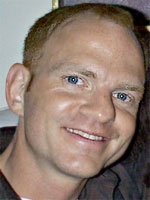
Dr. Matthew Caleb
Dr. Matthew Caleb, assistant professor of clinical medicine, died May 15. He was 41 years old.
Dr. Caleb served as the director of Medical Informatics in the Department of Emergency Medicine at NewYork Weill Cornell and was an assistant attending physician at NewYork-Presbyterian Hospital. He had a broad range of experience as a clinical practitioner in both internal medicine and emergency medicine and was highly skilled in designing and implementing health-care information systems.
Born Feb. 12, 1962 in Cleveland, Ohio, Dr. Caleb came to Ithaca, N.Y. in 1980 to attend Cornell University's College of Arts and Sciences. Over the next four years he excelled academically, graduating first in his class as a member of three honor societies, Phi Beta Kappa, Phi Kappa Phi and Alpha Lambda Delta.
In 1984, Dr. Caleb entered Cornell University Medical College where he again excelled, graduating as a member of the medical honor society, Alpha Omega Alpha. In 1988, Dr. Caleb began his residency training in internal medicine at The New York Hospital-Cornell University Medical Center and upon completion of his residency, he accepted a position as an attending physician in the New York Hospital Emergency Department—a position he held for the next 12 years until his death.
At a memorial service for Dr. Caleb held June 19 at the Medical College, Dr. Neal Flomenbaum, professor of clinical medicine and emergency physician-in-chief at NewYork Weill Cornell, shared anecdotes that spoke to Dr. Caleb's "courage, stamina, perseverance and most of all, to his integrity."
"Matt Caleb was one of the first New York-Cornell Emergency Physicians I met after accepting my current position in 1996. I remember being struck by the compassion Matt demonstrated while stabilizing the medical condition of an elderly patient who had just been transferred to our Emergency Department from another hospital. I have since observed Matt deal with many, many patients in the same sincere and humane manner, while expertly managing their medical and surgical problems. Matt truly cared about the feelings of all of the patients he came into contact with as well as those of all of the physicians, nurses, clerks, registrars, administrators, secretaries and staff he worked with."
Dr. Flomenbaum also reflected on Dr. Caleb's contributions to NewYork Weill Cornell's Department of Emergency Medicine: "Lacking a patient encounter and tracking system for the computers installed throughout our brand new Emergency Department in 1997, Matt created 'E-Track,' which will insure that Matt continues to contribute to patient care in the future. And even if E-Track is one day replaced, it will always be Matt who single-handedly enabled all of the physicians and nurses, who had never touched a computer before, to transition into the new electronic age of patient care. At the time of his death, Matt had already made preliminary plans to orient the inaugural class of emergency medicine residents to all of the information systems they would need to master, in order to function in our emergency department and hospital."
"On a personal note, what I admired and respected most about Matt Caleb was that you could have an honest discussion and sometimes disagreement with him regarding an issue and yet not ever be hesitant or afraid to approach him a few minutes later for any reason, including a request for help with another issue. Matt may not have changed his mind once he committed to something, but he never held a grudge or carried a chip on his shoulder. Emergency physicians pride themselves on being able to deal with everything and anything, especially life's unexpected tragedies and catastrophic illnesses. Yet I confess to you, over a month after Matt's death I remain somewhat bewildered. More than anything else, I feel a profound sense of sadness. Like all of you, I celebrate Matt Caleb's accomplishments while I mourn his loss. I miss my colleague Dr. Caleb, but even more, I miss my friend Matt," Dr. Flomenbaum concluded.

